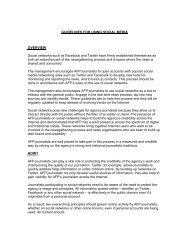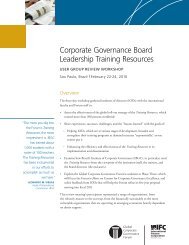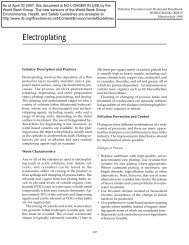Corporate Governance for Banks in Southeast Europe: Policy - IFC
Corporate Governance for Banks in Southeast Europe: Policy - IFC
Corporate Governance for Banks in Southeast Europe: Policy - IFC
Create successful ePaper yourself
Turn your PDF publications into a flip-book with our unique Google optimized e-Paper software.
D. Synopsis: BCBS Pr<strong>in</strong>ciples <strong>for</strong> enhanc<strong>in</strong>g corporate governance (2010)Sound corporate governance pr<strong>in</strong>ciplesBoard’s overall responsibilitiesPr<strong>in</strong>ciple 1: The board has overall responsibility <strong>for</strong> the bank, <strong>in</strong>clud<strong>in</strong>g approv<strong>in</strong>g and oversee<strong>in</strong>g theimplementation of the bank’s strategic objectives, risk strategy, corporate governance, and corporate values.The board is also responsible <strong>for</strong> provid<strong>in</strong>g oversight of senior management.Board QualificationsPr<strong>in</strong>ciple 2: Board members should be and rema<strong>in</strong> qualified, <strong>in</strong>clud<strong>in</strong>g through tra<strong>in</strong><strong>in</strong>g, <strong>for</strong> their positions.They should have a clear understand<strong>in</strong>g of their role <strong>in</strong> corporate governance and be able to exercise soundand objective judgment about the affairs of the bank.Board’s own practices and structurePr<strong>in</strong>ciple 3: The board should def<strong>in</strong>e appropriate governance practices <strong>for</strong> its own work and have <strong>in</strong> placethe means to ensure that such practices are followed and periodically reviewed <strong>for</strong> ongo<strong>in</strong>g improvement.Group StructuresPr<strong>in</strong>ciple 4: In a group structure, the board of the parent company has the overall responsibility <strong>for</strong> adequatecorporate governance across the group by ensur<strong>in</strong>g that there are governance policies and mechanismsappropriate to the structure, bus<strong>in</strong>ess, and risks of the group and its entities.Senior managementPr<strong>in</strong>ciple 5: Under the direction of the board, senior management should ensure that the bank’s activities areconsistent with the bus<strong>in</strong>ess strategy, risk tolerance/appetite, and policies approved by the board.Risk management and <strong>in</strong>ternal controlsPr<strong>in</strong>ciple 6: <strong>Banks</strong> should have an effective <strong>in</strong>ternal controls system and a risk management function(<strong>in</strong>clud<strong>in</strong>g a chief risk officer or equivalent) with sufficient authority, stature, <strong>in</strong>dependence, resources, andaccess to the board.Pr<strong>in</strong>ciple 7: Risks should be identified and monitored on an ongo<strong>in</strong>g firmwide and <strong>in</strong>dividual-entity basis,and the sophistication of the bank’s risk management and <strong>in</strong>ternal control <strong>in</strong>frastructures should keep pacewith any changes to the bank’s risk profile (<strong>in</strong>clud<strong>in</strong>g its growth) and to the external risk landscape.Pr<strong>in</strong>ciple 8: Effective risk management requires robust <strong>in</strong>ternal communication with<strong>in</strong> the bank about risk,both across the organization and through report<strong>in</strong>g to the board and senior management.Pr<strong>in</strong>ciple 9: The board and senior management should effectively use the work conducted by <strong>in</strong>ternal auditfunctions, external auditors, and <strong>in</strong>ternal control functions.CompensationPr<strong>in</strong>ciple 10: The board should actively oversee the compensation system’s design and operation, and shouldmonitor and review the compensation system to ensure that it operates as <strong>in</strong>tended.Pr<strong>in</strong>ciple 11: An employee’s compensation should be effectively aligned with prudent risk tak<strong>in</strong>g:compensation should be adjusted <strong>for</strong> all types of risk; compensation outcomes should be symmetric with riskoutcomes; compensation payout schedules should be sensitive to the time horizon of risks; and the mix ofcash, equity, and other <strong>for</strong>ms of compensation should be consistent with risk alignment.66<strong>Policy</strong> Brief<strong>Corporate</strong> <strong>Governance</strong> <strong>for</strong> <strong>Banks</strong> <strong>in</strong> <strong>Southeast</strong> <strong>Europe</strong>













![Print a two-page fact sheet on this project [PDF] - IFC](https://img.yumpu.com/43449799/1/190x245/print-a-two-page-fact-sheet-on-this-project-pdf-ifc.jpg?quality=85)


